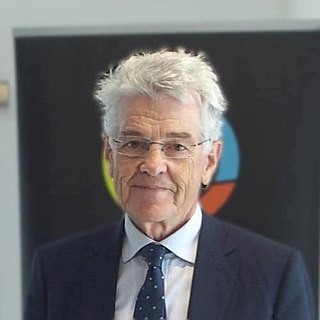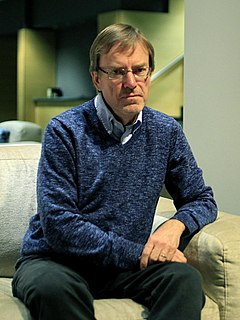
Macroeconomics is a branch of economics dealing with performance, structure, behavior, and decision-making of an economy as a whole. For example, using interest rates, taxes, and government spending to regulate an economy’s growth and stability. This includes regional, national, and global economies. According to a 2018 assessment by economists Emi Nakamura and Jón Steinsson, economic "evidence regarding the consequences of different macroeconomic policies is still highly imperfect and open to serious criticism."

Post-Keynesian economics is a school of economic thought with its origins in The General Theory of John Maynard Keynes, with subsequent development influenced to a large degree by Michał Kalecki, Joan Robinson, Nicholas Kaldor, Sidney Weintraub, Paul Davidson, Piero Sraffa and Jan Kregel. Historian Robert Skidelsky argues that the post-Keynesian school has remained closest to the spirit of Keynes' original work. It is a heterodox approach to economics.

In economics and political science, fiscal policy is the use of government revenue collection and expenditure to influence a country's economy. The use of government revenue expenditures to influence macroeconomic variables developed in reaction to the Great Depression of the 1930s, when the previous laissez-faire approach to economic management became unworkable. Fiscal policy is based on the theories of the British economist John Maynard Keynes, whose Keynesian economics theorized that government changes in the levels of taxation and government spending influence aggregate demand and the level of economic activity. Fiscal and monetary policy are the key strategies used by a country's government and central bank to advance its economic objectives. The combination of these policies enables these authorities to target inflation and to increase employment. Additionally, it is designed to try to keep GDP growth at 2%–3% and the unemployment rate near the natural unemployment rate of 4%–5%. This implies that fiscal policy is used to stabilize the economy over the course of the business cycle.

The economic policy of governments covers the systems for setting levels of taxation, government budgets, the money supply and interest rates as well as the labour market, national ownership, and many other areas of government interventions into the economy.
Fiscalism is a term sometimes used to refer the economic theory that the government should rely on fiscal policy as the main instrument of macroeconomic policy. Fiscalism in this sense is contrasted with monetarism, which is associated with reliance on monetary policy. Fiscalists reject monetarism in a non-convertible floating rate system as inefficient if not also ineffective

Modern Monetary Theory or Modern Money Theory (MMT) is a heterodox macroeconomic theory that describes currency as a public monopoly and unemployment as evidence that a currency monopolist is overly restricting the supply of the financial assets needed to pay taxes and satisfy savings desires. MMT is opposed to the mainstream understanding of macroeconomic theory, and has been criticized by many mainstream economists.

Henry Calvert Simons was an American economist at the University of Chicago. A protégé of Frank Knight, his antitrust and monetarist models influenced the Chicago school of economics. He was a founding author of the Chicago plan for monetary reform that found broad support in the years following the 1930s Depression, which would have abolished the fractional-reserve banking system, which Simons viewed to be inherently unstable. This would have prevented unsecured bank credit from circulating as a "money substitute" in the financial system, and it would be replaced with money created by the government or central bank that would not be subject to bank runs.
The neoclassical synthesis (NCS), neoclassical–Keynesian synthesis, or just neo-Keynesianism was a neoclassical economics academic movement and paradigm in economics that worked towards reconciling the macroeconomic thought of John Maynard Keynes in his book The General Theory of Employment, Interest and Money (1936). It was formulated most notably by John Hicks (1937), Franco Modigliani (1944), and Paul Samuelson (1948) dominated economics in the post-war period and formed the mainstream of macroeconomic thought in the 1950s 1960s, and 1970s.
A job guarantee (JG) is an economic policy proposal that aims to provide a sustainable solution to inflation and unemployment. Its aim is to create full employment and price stability by having the state promise to hire unemployed workers as an employer of last resort (ELR).

Non-accelerating inflation rate of unemployment (NAIRU) is a theoretical level of unemployment below which inflation would be expected to rise. It was first introduced as NIRU by Franco Modigliani and Lucas Papademos in 1975, as an improvement over the "natural rate of unemployment" concept, which was proposed earlier by Milton Friedman.
Colm Kearney (1954–2018) was an Irish economist and academic, who was dean of the Faculty of Business and Economics at Monash University, Melbourne, Australia, until 2017, shortly before his death on 28 March 2018.

William Francis Mitchell is a professor of economics at the University of Newcastle, New South Wales, Australia and Docent Professor of Global Political Economy at the University of Helsinki, Finland. He is one of the founding developers of Modern Monetary Theory.

Joan Muysken is a Dutch professor emeritus of Economics at the Maastricht University.

The Barcelona Development Agenda is a statement of development principles formulated as a response to the prevailing Washington Consensus development model. Resulting from the collaboration of economists from both developing and developed countries at the 2004 Universal Forum of Cultures in Barcelona, Spain, the Barcelona Development Agenda outlines seven lessons learned from previous policy failures and successes, and presents them as priorities for future economic reforms. The principles emphasize a balance of market and government economic roles, flexible economic tools, and an increased role for sustainability and equity in governance.

Larry Randall Wray is a professor of Economics at Bard College and Senior Scholar at the Levy Economics Institute. Previously, he was a professor at the University of Missouri–Kansas City in Kansas City, Missouri, USA, whose faculty he joined in August 1999, and a professor at the University of Denver, where he served from 1987 to 1999. He has served as a visiting professor at the University of Rome, Italy, the University of Paris, France, and the UNAM, in Mexico City. From 1994 to 1995 he was a Fulbright Scholar at the University of Bologna. From 2015 he is a Visiting professor at the University of Bergamo.
Simon Wren-Lewis is a British economist. He is a professor of economic policy at the Blavatnik School of Government at Oxford University and a Fellow of Merton College.

In macroeconomics, chartalism is a theory of money that argues that money originated historically with states' attempts to direct economic activity rather than as a spontaneous solution to the problems with barter or as a means with which to tokenize debt, and that fiat currency has value in exchange because of sovereign power to levy taxes on economic activity payable in the currency they issue.
Full Employment Abandoned: Shifting Sands and Policy Failures is a book on macroeconomic issues, written by economists William Mitchell & Joan Muysken and first published in 2008.

Pavlina R. Tcherneva is an American economist, of Bulgarian descent, working as associate professor and director of the economics program at Bard College. She is also a research associate at the Levy Economics Institute and expert at the Institute for New Economic Thinking.

David I. Meiselman was an American economist. Among his contributions to the field of economics are his work on the term structure of interest rates, the foundation today of the implementation of monetary policy by major central banks, and his work with Milton Friedman on the impact of monetary policy on the performance of the economy and inflation.








